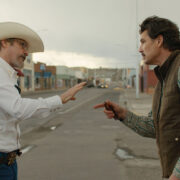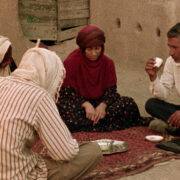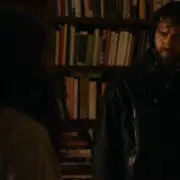A SYRIAN LOVE STORY: The Human Face Of A Global Crisis
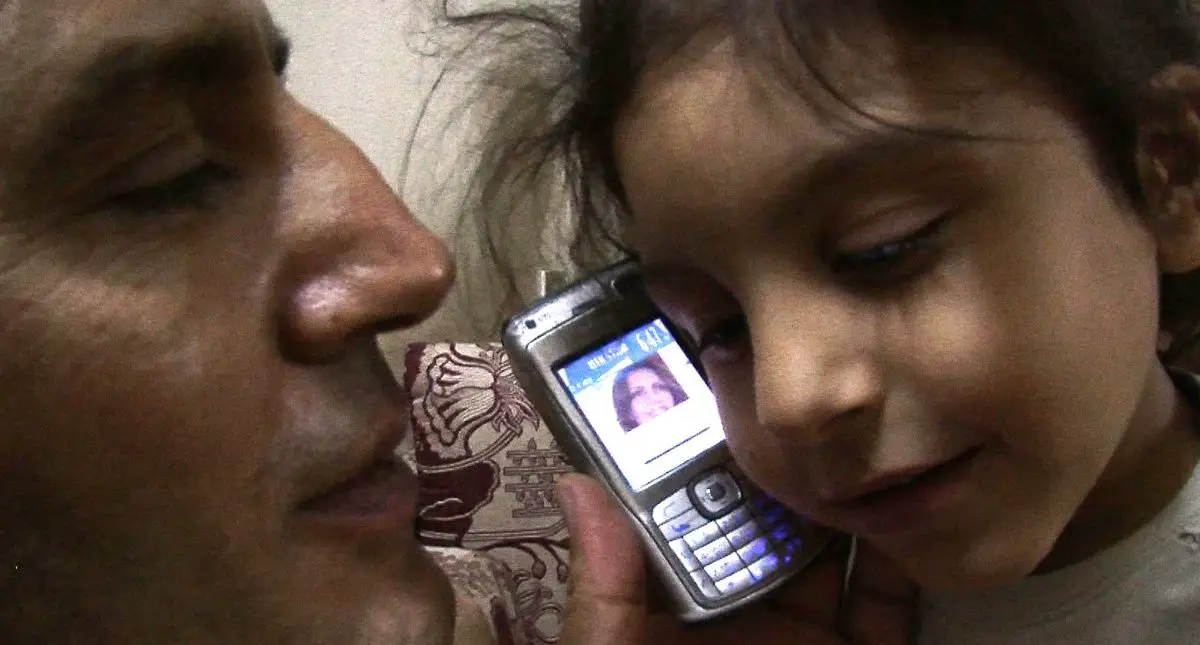
Becky spends her days working in TV and she spends…
A Syrian Love Story is the latest investigative documentary from award winning filmmaker-journalist Sean McCallister. Renowned for his hard-hitting documentaries which go further than others dare to, McCallister follows a Syrian family over a 5 year period – through love, separation, prison, war and freedom. Beginning an extra-ordinary journey, activists Raghda and Amer meet in their youth in a Syrian prison, detained for their positions as high profile anti-Assad activists.
McCallister joins the family in 2000, where Raghda is currently being held in prison for writing a book criticizing the Assad regime and Amer is attempting to hold their small family together until she returns. Amidst the constant fear of abduction and torture, A Syrian Love Story is, for the most part, a story about a family trying to stay together despite everything that life has thrown at them.
After fleeing Syria for Lebanon, the family are eventually granted asylum in France, due to Raghda’s status as a known revolutionary. Although the family are out of danger, the strain on Raghda and Amer seems to have bought their relationship to breaking point. McCallister passively portrays the slow and painful breakdown of their marriage, the effect on their children and their growing fears about their beloved home country. A film about identity, nationalism and above all freedom, A Syrian Love Story lets us engage with a family’s story which we may otherwise never get to see.
Uncovering A Real Story
What is perhaps the most striking element of A Syrian Love Story is McCallister’s brutal honesty throughout. He begins the film discussing the growing tourist industry in Syria, and the reluctance of the Syrian people to discuss Assad or the government. He tells us quite clearly that he is determined to get behind the ‘fake-ness’ and to uncover a real story – something which he achieves upon meeting Amer.
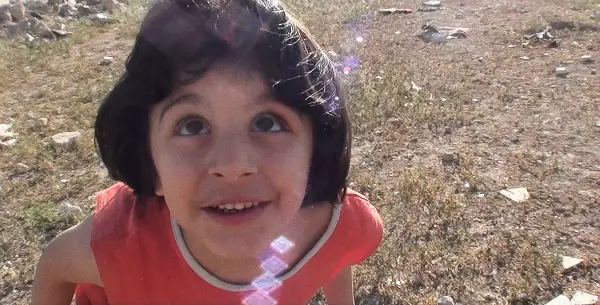
What is immediately evident is just how quickly McCallister gains the trust of Amer and his two youngest children: Kaka and Bob. They talk freely with one another, about their situation, about Raghda being imprisoned and about the revolution. In the five years it was shot, the boys literally grow up in front of the camera – vocalizing their varying feelings on the revolution as they get older.
Visually, A Syrian Love Story feels very much like a home video, and McCallister is merely a family member who is always behind the camera (at one point an exasperated Bob explains to his friends that McCallister is not his uncle). In a particularly touching scene, Kaka describes how his parents met – through a hole in a prison wall. He is embarrassed, much like any fourteen year old reciting stories about their parents. The film retains this level of humanity throughout its duration, through scenes which are wholly familiar to anyone with a family, despite the horrific context against which the film is set.
Raghda’s return, towards the beginning of the film, marks one of these moments. With no dialogue, McCallister uses only silent footage to mark Raghda’s return. The ecstasy on Amer’s face, and the delight of their children, speaks volumes – and the silence only emphasizes this. It is a particularly powerful scene, inter-cutting archive news footage with footage of Raghda’s return. This helps us to better understand what has happened and why Raghda has suddenly been released from prison.
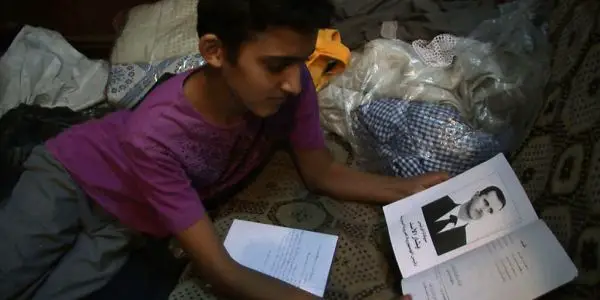
Once the family are eventually settled in France, Amer and Raghda no longer live in constant fear, but they also no longer live in Syria – the country which Raghda loves. She becomes withdrawn, depressed and attempts suicide. Throughout the second half of the film, McCallister carefully depicts Raghda’s homesickness – it is sensitive, uncomfortable and above all, understandable. “She wants to be something, she wants to change something. She cannot be Che Guevera and a mother,” Amer says of Raghda as their relationship falls apart.
The film is no longer about the fight for Syria, it is about the fight to save Raghda and Amer’s relationship. Images of Raghda and Amer holding hands in Paris and the two arguing are juxtaposed – along with Bob and Kaka realizing that their parents’ marriage is nearing an end. It is heartbreaking – for many, many reasons.
“What Has The West Done To Help Syria?”
There is no hidden political agenda behind A Syrian Love Story – McCallister’s agenda is only too clear. Assad and his forces are the villains, cruelly destroying Syria piece by piece. The film is highly politicized: it is impossible for it not to be due to the subject matter. We actually witness first hand the violence and censorship instigated by the Syrian Army: McCallister is detained and his footage destroyed part-way through the film.
At this point, his footage is almost entirely comprised of sequences with Amer, Raghda and their children, and this forces the family (and McCallister) to flee Syria to Lebanon. Although we sympathise with the family, it is through McCallister’s eyes which we see their plight. Once McCallister is imprisoned and threatened with torture, the complete rejection of human rights seems a lot more real. It is truly terrifying.
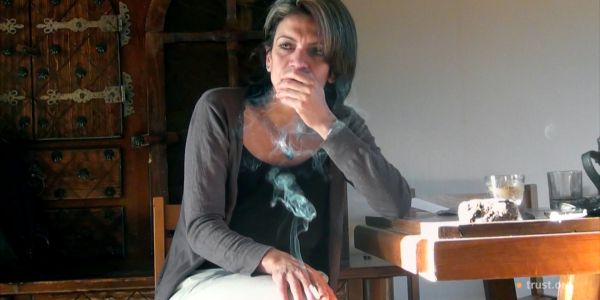
One incredibly profound aspect of the film, and one reason why it is so very relevant right now, is the discussion regarding refugee status that Amer has with McCallister. “What has the West done to help Syria?” Amer asks. He tells us, through the camera, that he knows what we (Westerners) think of Syrians. “We don’t want them to come here”. These are words we have all heard a thousand times, from the mouths of people who strongly believe that.
What A Syrian Love Story does so beautifully, and at no better time too, is to repeat those xenophobic phrases back to those in the West. It puts a human face on a global crisis, and shouts demands for help, help that should have been given long ago. Instead of the stereotypical imagery of asylum seekers clinging to the back of lorries, we see a family. A family who have been displaced, whose friends and peers have been executed, whose parents have both been imprisoned – for wanting nothing more than freedom.
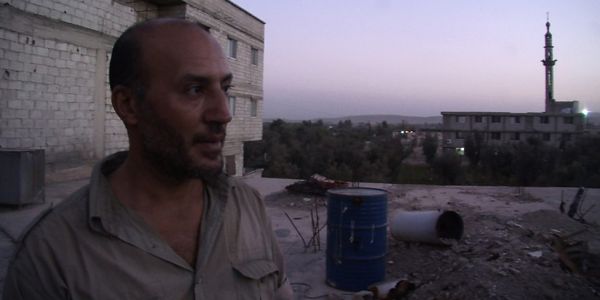
A Syrian Love Story can be slightly confusing at times, the documentary-style filmmaking means that shots are sometimes unfocused, too dark or badly framed. Many of the protests that the family go to cannot be filmed, and so some of the major events are relayed through conversation rather than first hand experience. This doesn’t alter the quality of the film however, it merely makes it a different type of film.Concerned less with ‘current events’ and more with the love and struggles of one small Syrian family, the lack of dramatic footage only adds to the film.
What can be off-putting is that, as an audience, you are required to know certain things about Syria and Bashar al-Assad, things which are not explained entirely within the film. It can be watched as simply an emotive piece of film-making, but it will probably make more sense if you brush up on your history first. The wider context of the Assad regime, and what is happening in Syria now, also allow for a deeper understanding of Raghda’s internal conflicts about leaving her home country. McCallister’s narration explains a lot, but it’s worth doing a bit of research.
Hope For Humanity
As political and investigative as it is, A Syrian Love Story can be stripped down to a simple story about two parents trying to keep it together for their children. Except, this family are living in a war zone, one of the parents is a known revolutionary, they are in danger every second of their lives and, above all, none of them want to leave the country they call home. It is a truly remarkable film, one that needs to be seen by everyone.
In many ways, Raghda remains the mysterious focal point of the film – the unwavering rebel, who confronts her inner demons to try and be a mother to her children. A Syrian Love Story may be about the family, but it is also about Raghda and her love for Syria, her need to fight (“I cannot abandon it now”). In the final scene, McCallister talks to Raghda (now in Turkey) and tells him that she still has hope, hope for humanity, freedom and her country. It is a poignant, uplifting end to what is ultimately a tragic story.
A Syrian Love Story aims to put names and faces to the problems in Syria, making the film personal and deeply emotional. It succeeds, in every way.
Have you seen A Syrian Love Story? What did you think?
A Syrian Love Story is currently out in selected UK cinemas, and available on BBC iPlayer to watch and download. It is being shown at a select amount of film festivals worldwide. Unfortunately, no international wide release is currently scheduled.
(top image source: 10ft Films Ltd)
Does content like this matter to you?
Become a Member and support film journalism. Unlock access to all of Film Inquiry`s great articles. Join a community of like-minded readers who are passionate about cinema - get access to our private members Network, give back to independent filmmakers, and more.
Becky spends her days working in TV and she spends every other minute writing about cinema, TV & feminism. Based in London, she also likes drinking gin, re-watching 'The X Files' and writing about on-screen representation and all manner of things over at femphile.com




